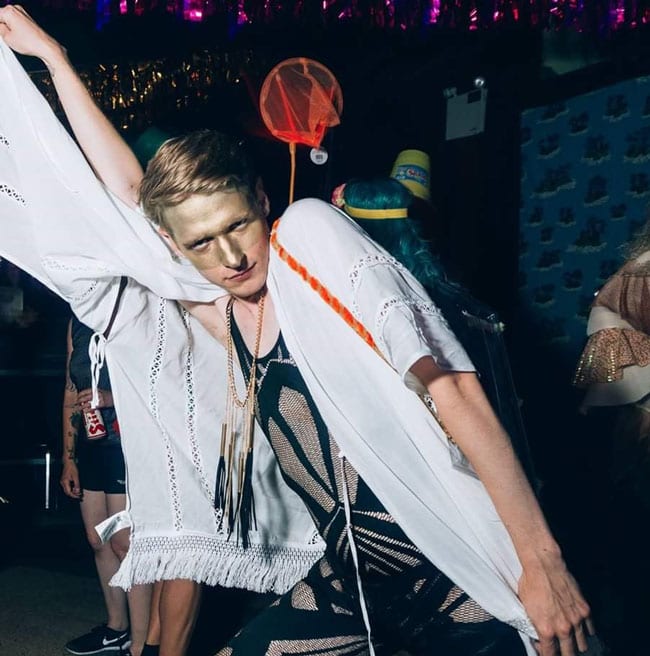Today on the site, Rob Kirby interviews the newly Eisner-nominated artist Eric Kostiuk Williams.
Rob Kirby: I wanted to give readers the full Eric Kostiuk Williams experience, so would you kindly give us a brief summary of Hungry Bottom Comics? You know, your impetus in starting it, the autobiographical aspects, etc.
Eric Kostiuk Williams: Hungry Bottom Comics was my means of processing the experience of coming into my own as a young gay guy in Toronto. The prospect of moving to a big city with a vibrant gay community felt like some utopian happy-place I'd been working towards -- a place I deserved, having put up with so much shit as a fey, sissy kid.
I quickly realized, however, that the sissy disposition didn't fare much better in the gay world than in the straight world -- especially in the late 2000s, when hookup apps were on the rise, along with their encouragement of a straight-acting "masc4masc" criteria. I was briefly dating a guy, and when we were getting ready to go out somewhere, he noticed I was applying eyeliner. He said, in the most derogatory tone, "Wow...you are a hungry bottom." The cumulative impact of internally-homophobic, body-fascist dudes made me want to take a big step back, reflect, vent, and figure out why we were in this place as a culture... and comics presented themselves as the perfect means for that.
I'd made a ton of comics growing up (mostly weird superhero stories, cribbing off X-Men and Buffy the Vampire Slayer) as a means of escape. So it felt very intense and potent coming back to comics, but for kind of the opposite purpose. I thought about the "hungry bottom" jibe and seized on the power of reclaiming it for my own purposes. There's a real magic in taking something hurtful, and twisting it into something subversive, funny, and without shame. You take away its power... you invert it for yourself.
As I got going, a few comic strips turned into a few pages, which eventually turned into three whole issues. While the series was technically autobio, each issue also incorporated elements of fantasy and cultural criticism. Man, they were hella fun, and healing, to work on. And as I self-published each issue and they made their way around Toronto, I was really happy to hear that the comics were healing for other folks, and that they could see themselves in the stories -- even if they were straight, or not male-identifying.
Meanwhile, elsewhere:
—Interviews & Profiles. For the SF Weeky, Jonathan Curiel profiles Roz Chast.
“For some people, their cartoons come out of a completely closed cartoon universe, and that works for them and that’s all they really want to do,” she says. “For me, the boundary between my life and the cartoon universe is a lot more porous. I do things from the cartoon universe. I love the end-of-the-world guys, with sticks, but they flow into one another more.”
As she talks, Chast sits in the middle of the Contemporary Jewish Museum’s second-floor exhibit space — on a bright red couch that’s a fill-in for the kind of furniture Chast would sit on with her parents in their longtime Brooklyn apartment. Nearby, under glass, are decades-old mementos from her parents’ home — some of the scores of books, photos, and memorabilia that her parents hoarded away and that Chast documents so funnily in her memoir.
The paranormal-focused website Daily Grail talks to Alan Moore.
Jerusalem wasn’t a call to somehow reinstate the past, or a suggestion that the past should have remained static, but rather was merely pointing out what an enormous fuckup we’ve made of the future: a future geared towards seemingly endless novelty and change for its own sake, where even the basic principles of progress and moving forward seem to have been completely abandoned and forgotten. There is absolutely no reason why things couldn’t genuinely progress while still respecting and retaining everything that was good and valuable about the situation they were progressing from.
As for the currently highly visible racism, misogyny, homophobia, transphobia, class prejudice and general anti-intellectualism that pervades what’s left of our culture, I can’t help noting that it’s usually when people are being trampled financially that they seem most prone to seeking some other, weaker social group to blame for their government-generated problems, and seem most prone to ugly but thoroughly predictable outbursts of fascism. Perhaps if society was in any way endeavouring to treat people fairly, then they might be more inclined to treat each other in a similar fashion. After all, if society was at all serious about wanting to get rid of these bigotries, then with more rigorous press control and more authentic understanding in the way we run our education system, it doesn’t seem impossible that they could be eliminated within a generation. We somehow never get around to doing that however, perhaps because under our current system it will always be expedient to have some demonised minority to act as a buffer between an electorate that feel victimised and the people in office who are actually responsible for that victimisation.
On The Treatment, Elvis Mitchell talks to George Herriman biographer Michael Tisserand.
The most recent guest on Inkstuds is Thi Bui.
—Reviews & Commentary. Sam Ombiri writes about Sammy Harkham's Crickets 6.
Harkham said in the past that he doesn’t want things to be expressive and moments to hold value over others. I think Harkham must see something similar in Brian Chippendale’s Ninja, where every panel has the same intensity. Or it’s like how Robert Bresson says he wants his actors to be like a virtuoso in portraying their afflictions. Of course other directors do this too – I only bring up Bresson because for me he has exhibited the most success with this mode of approaching expressiveness – in the way that I think Harkham is talking about.






